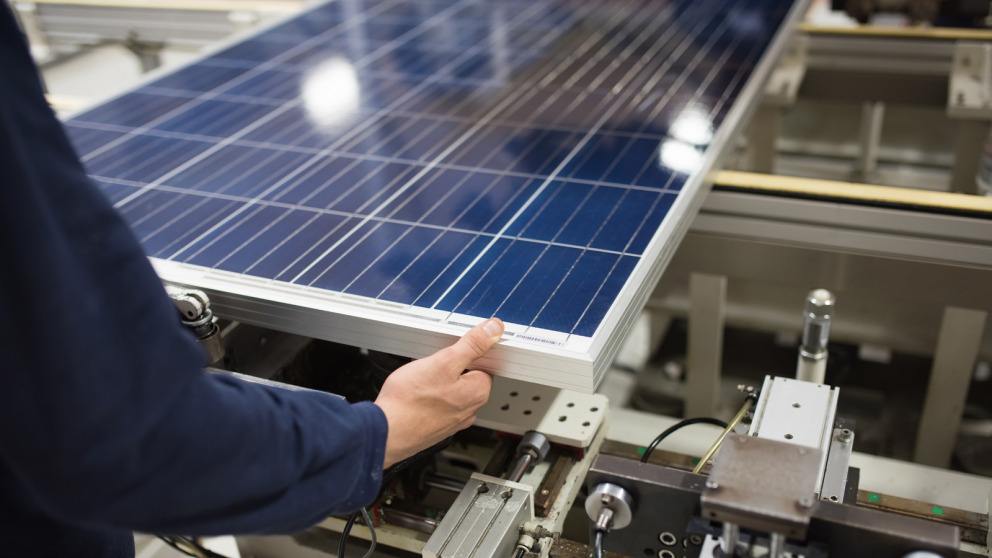Overline:
Pandemic
Headline:
Coronavirus shows it’s time to get strategic about renewable energy technology

The international health crisis has exposed a serious problem for energy systems – we’re not taking renewable energy technology seriously as a critical asset. Most solar panels today are made in China, and a shortage of key components means that Europe is now facing major delays in new installations. Wind power faces a double whammy – manufacturing is down, and countries may not have the personnel and parts locally to keep systems running. Countries should aim to build up national clean tech infrastructure in the same way that they ensure strategic reserves of fossil fuels.
Setbacks in solar manufacturing
China’s massive manufacturing and innovation capacity made solar PV cheap enough for the rest of the world to afford – but along with this progress, concerns about becoming overly dependent have emerged. The coronavirus adds a new layer: if large parts of the supply chain are concentrated in one country, a crisis there can throw a wrench in the energy transition.
China is the most important producer of PV modules worldwide, with around 60% of the world market share (or around 150 GW of manufacturing capacity). In January, the production of polysilicon, multicrystalline wafers, mono and multi-cells, and modules slowed down drastically. Chinese installations of solar will be lower in 2020 than projected, and the shipments to outside China were curtailed. The US solar manufacturing industry (which makes around 7.5 GW worth of modules a year) saw some companies staying open last week, but this situation might change as the pandemic worsens.
Meanwhile, these supply chain interruptions are being felt in Europe. In February, the BSW (Bundesverband Solarwirtschaft) estimated that the effects on industry in Europe would be relatively small, because businesses depended only to some extent on Chinese products – although even a relatively brief shortage would lead to higher prices. In France, solar projects were postponed but industry spokespersons remained optimistic that sites would resume operations soon. But as the crisis has continued, countries have had to adjust. Delays in equipment deliveries have meant that projects currently under construction have fallen behind schedule, PV magazine reports.
Yongping Zhai, energy expert for the Asian Development Bank, sees this as a wakeup call for countries that are dependent on China for equipment and parts. In particular, developing countries that are increasing their solar capacity would benefit from being involved in the clean energy value chain. The more countries develop their local capacities, the less dependent the world is on a single country, mitigating the risk of supply interruptions in times of crisis.
Wind energy at a double disadvantage
The wind sector is different from the solar sector in that its innovation systems are tightly linked to manufacturing, and tend to be more localized (there are ‘clusters’ for onshore wind in the US, Brazil, China, and Europe). The value chain for offshore wind is centralized in Europe, where just under 200 GW of wind power are in operation.
In February, European wind industry representatives interviewed by Tagesspiegel said that there was little danger of the outbreak in China impacting German wind energy. The only problem was that European industry depended on imports of materials like steel from China. Offshore wind representatives remarked that because the value chain was largely European, the industry was in a comparatively lucky situation. As the virus is spreading across Europe, with devastating effects, this ‘advantage’ of supply chain concentration has become a liability. As is the case for solar, projects are being put on hold worldwide.
Wind power faces an additional obstacle that so far has not emerged for solar: its turbines need upkeep from highly skilled and specialized personnel. For offshore wind, general maintenance can be kept up by local engineers, but bigger issues need specialists. WindEurope representatives expressed concern to Green Tech Media that German personnel could get stuck at the border due to coronavirus travel bans. And while the Danish power company Ørsted has stated that they hope to continue business as usual, they warned that service operation vessels could be affected by personnel shortages, further decreasing plant availability. In a worst case scenario, Europe’s wind power operating capacity may end up falling.
Long-term impacts
According a March Wood Mackenzie report, solar PV manufacturing in Asia is already beginning to bounce back from its January depression. However, installations of renewable energy will be far lower than predicted in China this year – meaning that energy systems will be slower to decarbonize in the long run. So, even if Chinese PV manufacturing is back on track, demand for modules may remain low. This will be further exacerbated if the European and North American health crisis worsens. With wind manufacturing and operation in Europe hit hard, wind generation capacity will (at best) remain the same, and at worst decrease.
Coronavirus is a stress test for all our systems, renewable energy included. It has showed us that an international health crisis can play havoc with PV module supply and halt new installations; and that wind power is doubly vulnerable to disruptions in both new installations and maintenance. These are not just niche industries: in 2030, 32% of EU final energy consumption should come from renewables.
Countries have strategic reserves for fossil fuels in the case of a crisis – it’s time to think strategically about what we’ll need to build up in terms of hardware and expertise in a 100% renewable scenario. This would mean adding manufacturing capacity for clean energy technology, both solar and wind. In addition, countries need to ensure that they have the skilled personnel and infrastructure to maintain their existing RES capacity, especially offshore wind. As the EU debates how to boost the European economy, it should consider the clean tech industry as not only a way to add jobs, but increase the security of energy supply.

Add new comment